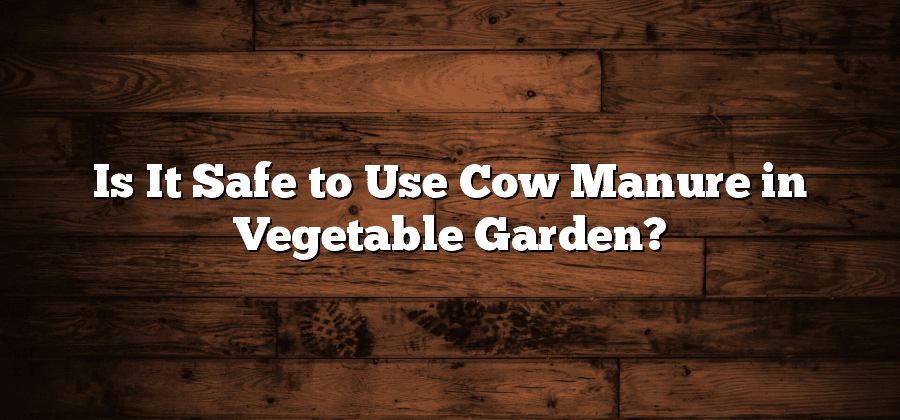Pros of Using Cow Manure in Vegetable Garden
Cow manure is hailed as an excellent natural fertilizer for vegetable gardens due to its numerous benefits. Firstly, it is a rich source of nutrients, such as nitrogen, phosphorus, and potassium, which are essential for plant growth. These nutrients promote healthy root development, vigorous foliage, and abundant fruit production. Additionally, cow manure improves soil structure by enhancing its water-holding capacity, aeration, and drainage. This ultimately creates an optimal growing environment for vegetables, leading to higher yields and healthier plants.
Moreover, the use of cow manure in vegetable gardens contributes to sustainable farming practices. Recycling animal waste as a natural fertilizer reduces the reliance on synthetic fertilizers, which can be harmful to the environment. Cow manure also aids in maintaining the balance of soil microorganisms, such as beneficial bacteria and fungi, which play a crucial role in nutrient cycling and disease suppression. By incorporating cow manure into the garden, farmers can minimize their ecological footprint while ensuring the long-term health and productivity of their crops.
Cons of Using Cow Manure in Vegetable Garden
While cow manure can provide many benefits to a vegetable garden, there are also potential downsides to consider. One of the main concerns is the risk of pathogens. Cow manure can contain various bacteria, viruses, and parasites that can pose a threat to both plants and humans. If not properly composted or treated, these pathogens can contaminate the soil and potentially transfer to the vegetables grown in it. This can lead to foodborne illnesses and health hazards, especially if the vegetables are consumed raw or undercooked.
Another drawback of using cow manure is the potential for weed seeds. Cows consume a wide variety of plants, and their manure may contain undigested weed seeds. When used as a fertilizer, these seeds can germinate and compete with the vegetables for nutrients, sunlight, and space. This can result in a higher weed population in the garden, requiring additional time and effort for weed control.
Ultimately, while cow manure can be a valuable source of nutrients for vegetable gardens, it is crucial to take precautions to address the potential risks associated with pathogens and weed seeds.
Benefits of Organic Fertilizers for Vegetables
Organic fertilizers have gained popularity among vegetable gardeners due to their numerous benefits. One key advantage is that they improve soil quality by increasing its nutrient content. Unlike synthetic fertilizers that may disrupt the soil’s natural balance, organic fertilizers provide essential nutrients in a slow-release form, allowing plants to absorb them more effectively. This enhances the overall health and productivity of the vegetable garden.
Additionally, organic fertilizers contribute to the long-term sustainability of the garden. They are derived from natural, renewable sources such as animal manure, compost, and plant-based materials. By using these fertilizers, gardeners reduce their reliance on chemical inputs that can have negative impacts on the environment. This eco-friendly approach fosters biodiversity and encourages the development of beneficial organisms in the soil, ultimately creating a self-sustaining ecosystem within the garden.
Potential Risks of Using Cow Manure
When it comes to using cow manure as a fertilizer in your vegetable garden, it is important to be aware of some potential risks. One of the major concerns is the presence of harmful pathogens in the manure. Cow manure, if not properly composted, can contain bacteria such as E. coli and Salmonella, which can pose a risk to human health when consumed through contaminated vegetables.
Furthermore, cow manure may also contain weed seeds. Cows consume grass and hay, which can contain weed seeds that pass through their digestive system and end up in their manure. If this manure is used as a fertilizer without proper composting or processing, these weed seeds can potentially find their way into your vegetable garden. Dealing with weeds can be time-consuming and can compete with your vegetable plants for water, nutrients, and sunlight.
It is essential to understand these potential risks associated with using cow manure as a fertilizer in your vegetable garden, and take necessary precautions to mitigate them.
Understanding the Composition of Cow Manure
Cow manure is a valuable source of nutrients for plants due to its rich composition. It is composed of organic matter, such as partially decomposed plant material, as well as essential nutrients like nitrogen, phosphorus, and potassium. This makes cow manure an excellent choice for fertilizing vegetable gardens.
The composition of cow manure can vary depending on factors such as the diet of the cows and their age. Generally, cow manure contains approximately 2-3% nitrogen, 1-2% phosphorus, and 2-3% potassium. These nutrients are essential for the healthy growth and development of vegetable plants. Additionally, cow manure also contains other micronutrients such as calcium, magnesium, and sulfur, which further contribute to the overall health and vitality of plants.






